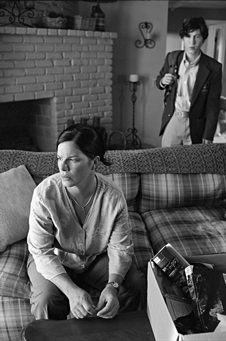Strong performances battle weak writing in “American Gun”
Interesting and somewhat contrived, “American Gun,” Aric Avelino’s directorial debut, is a decent, if small-scale example of a relatively new trend in American cinema—the episodic drama. The film, which intersperses three stories of gun violence in America, has already been compared to other similar such films as “Crash” and “Traffic,” but it falls short in comparison to both.
The three stories are mostly composed of what seem like clichés and ideas taken from other films. In the first story, we’re introduced to, the admirable Marcia Gay Harden who portrays the single mother of a now-deceased, Columbine-like shooter and her remaining son, who is played effectively by young character actor Chris Marquette. While we watch Harden struggle with single parenthood, a traumatized kid, and a neighborhood that blames her for their children’s deaths, the thought might occur that Oscar-winner Harden is a bit too qualified for the formulaic action that follows.
Another wasted actor in Harden’s story is Nikki Reed, who to this critic appears well on her way to movie stardom already. She takes the few lines she has and steals a good bit of film with them.
Actually, the entire film turns out to be less a compelling story about mutual violence than a war of sorts between strong performances and weak writing. Certainly this is evident in the second scenario—a story about a hard-working inner-city principal (Forest Whitaker) whose job is thankless and whose students are gun-toting. Now if this story seems somewhat familiar, that is because in fact it bears much in common with a thousand other such recently re-enacted dramatizations. It is a scene right out of the television show “Boston Public.”
Also in the school where Whitaker teaches is another poorly written character strung on an unwitting actor. Jay—the hard-working youth who’s headed for a life of violence—is played by the talented Arlen Escarpeta; he does his best with what is essentially a positive stereotype. It’s probably worth nothing that Escarpeta played a similar role on “Boston Public.” Gee.
In the last of the film’s vignettes, and the most underwritten, a college student played by Linda Cardellini works in her “pop-pop’s” gun store and stops her friend from being raped, in what appears to be leftover footage from ‘80s public service announcements. This final story, mercifully brought to the front less often than the others, seems to serve no real purpose in the film other than to highlight that a girl can work in a gun shop, and that people from California call their grandparents “pop-pop”.
Still despite these obvious flaws, Avelino should be credited for several things—casting not the least among them. If “American Gun” doesn’t feel like it takes you anywhere new—even the title has been used before—at least it does so unassumingly, and without the sort of tacked-on message that “Traffic” and “Crash” bore so gracelessly. Still, the message best derived from “American Gun” is simple—“Don’t do three stories if you can’t get one right.”
gaycitynews.com

































